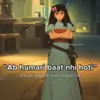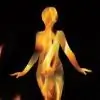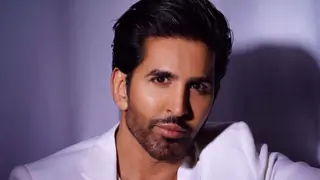In 1950's when Mr. Nehru was Indian PM, a group of students from Oxford University wrote him a letter expressing their wish to visit Taj Mahal and Nehru granted them permission. It also was the times when Taj Mahal was under strict security surveillance due to threats to the monument from various centres. But in relation to the visit of Oxford students, spread rumours all over India that they would destroy Taj and Nehru would be killed. When the whole country was agitated by this news, those students came, visited Taj and returned without causing any security issue. Then what did cause such a big rumour? A small phrase used by those students in their letter to Nehru!!! They wrote, "...we are planning to hit the road for the Taj Mahal" and some improperly educated Indian interpreted "hit the road" as it appealed to his equally improper mind. Now you must be smiling or feeling "yuk" as you know what exactly "hit the road" means.
But what has this to do with "Tragic Hero"?
Nothing except that the standard of Indians' English has not at all improved. Let me exclude the students and degree holders of Language and Literature. Others are pretty much the same as for an average Indian English and Maths are two brutal villains in school. "Tragic Hero" is not our neighbour uncle's son so that we can be so certain about what all we have assumed about him are true.
So who is a TRAGIC HERO?
Let us try to understand English through English, not any Indian languages and ideology as both terms "Tragic" as well as "Hero" are English. Don't we think we all know English? In reality all we know is HinGlish, ManGlish, KanGlish, TamGlish, TelGlish etc... Put aside your Indian thinking for some time, be a British or Greek or Roman. This hero hails from there!!!
* * *
"Tragic" is the adjective of "Tragedy". "Tragedy" is the most overused as well as misused term today, especially in India. According to us, tragedy means only a "sad event of great loss and misfortune". But to be precise, not every loss, not every misfortune, not every death or massive death or fatal accident cannot be "Tragedy". This term is too powerful to be used in everyday events. To specify, "Tragedy" includes some moral failure, a flaw in character, or an extraordinary combination of events resulting in an undesired effect like death.
The first reference to "Tragedy" dates back to 5th cent BC, to refer a work of art that probes with high seriousness questions concerning the role of man in the Universe. Later it developed into a literary genre and only then we got this word in regular use.
Tragedy is a form of art (chiefly drama) based on human suffering that invokes "pity" and "fear" in audiences, as described by Aristotle (don't even ask who is that if you have passed 5th STD) in Poetics - the earliest surviving work of dramatic theory and the first philosophical treatise to focus on literary theory.
"Pity", as explained by Aristotle, means (in simple words) feeling for others, feelings of sadness and pain for the destructive or painful harm of someone who does not deserve it. Hence, to feel pity, the person must be convinced that the sufferer does not deserve his fate.
"Fear", as explained by Aristotle, (in simple words) is the emotion caused by whatever we feel has great power of destroying or harming us in ways that tend to cause us great pain. It can also be a feeling of profound respect for someone or something.
Tragedy depicts the downfall of a noble character through a combination of his own flaws, fate, and the will of the gods (a higher authority). The tragic hero's powerful wish to achieve some goal inevitably encounters limits, usually those of human frailty (flaws in reason, confidence, society), the gods (through oracles, prophets, fate), or nature.
In short, audiences must relate themselves with the main character and feel pity and fear for his fate.
TRAGIC HERO is the chief character of a Tragedy. There are certain differences between modern and Aristotelian concepts of Tragic Hero. But we don't need to look into all that. I shall try explaining as much I have understood about what makes a character Tragic Hero as that is more or less the same everywhere.
What does make a character Tragic Hero?
"A man cannot become a hero until he sees the root of his downfall." Aristotle
Noble status -
Aristotle says that the hero must be "a man of eminence" and "someone of high-fame and flourishing prosperity." He must be someone like a king, a prince, or a leader of a group etc. In ancient times, nobility was royal family but today it could be social status as well. Since Tragedy is the "fall" of a Hero, unless he has a lofty position to fall from, audience might not be able to experience themselves his fall. If the hero is not from a higher status (of any kind) it will only make the audience feel pathetic.
Neither good nor bad -
If the hero is 100% virtuous, people will either feel shocked and disgusted with his fall or not care especially because of his ideological superiority. If the hero is extremely evil, then the audience will feel that he got what he deserved. No "pity" and "fear" will be felt in both cases. Hence there must be a balance in the hero's character.
The ideal tragic hero must be an intermediate kind of person who is not morally and virtuously far superior or far inferior to common people. The audience can more easily identify with him because of this, and the audience does not wish the hero tragedy. The suffering and fall of such a hero will generate "pity" because his misfortune is not in accordance with his error of judgement, and his visible goodness will generate "fear" for his doom; which are crucial in tragedy.
In Aristotle's own words, "A man who is not eminently good and just yet whose misfortune is brought by some error of frailty". Hence, the hero must be a man of outstanding quality and greatness with minor flaw(s) in his character. The entire tragedy should issue from this minor flaw(s).
Intelligence -
The hero must be intelligent so that he himself can recognise his own mistakes and may learn from them, without external interferences. This will make the audience feel for him thinking "had he known earlier".
Not only that, he must be "a man of actions" and his actions must be "serious, complete and of a certain magnitude", as Aristotle says.
Tragic flaw -
Tragic flaw is the trait or quality which under normal circumstances is a desirable virtue but turns fatal under some special circumstances.
For example, Hamlet's failure to act due to his contemplative nature is what turned fatal to him. But under normal circumstances, contemplative nature is a desirable quality.
So the tragic flaw is not an absolute flaw in character, but a central part of virtue getting twisted due to lack of knowledge of the depth of complete scenario. The hero's misfortune, then, is not that of an evil character who simply succumbs to his failings, but that of a virtuous character consumed by circumstances in which his virtue itself proves fatal to him.
With this imperfection of a noble man, the audience see themselves in the hero and feel when he falls.
An irreversible decision -
The hero must meet with a set circumstances in which he has to take a serious, important decision that changes the whole picture. Neither the hero not the audience get to know the changed picture until a particular time. This is due to the unawareness of the complete truth at the time of decision making.
Error of judgement -
The hero should make an error of judgement while taking the serious decision. The trait of making errors must not be his inherent quality, because that makes the audience to lose respect for him and not feel "pity" towards him. Also, if this error making is accidental or involuntary, the audience may not feel "fear". Hence his error must be a human failing and human weakness resulting out of the hero's tragic flaw.
Free will -
For a true tragedy to happen, an element of free will must be there. That is, the hero must be free to choose from but he unknowingly chooses the wrong. The hero meets his fate but chooses on his own without any external influence.
This puts the audience in a paradox - is free will or fate ultimately responsible for the hero's fall and suffering? Because as much as the Hero is responsible for what he chooses, that much the fate also is responsible for bringing him what all to choose from. Along with fate, the choice of hero ultimately brings his destruction.
Hence the audience sees themselves in the hero, in the light of misfortunes happened in their own lives.
Reversal of fortune -
The above four factors combined together bring the reversal of fortune in Hero's life. But this reversal must be from good to bad. Also it must not be the result of vice of depravity, but the tragic flaw and error of judgement alone. Otherwise, it generates no pity.
In addition, the fate often reveals the true identity of the Hero at this point.
Recognition -
"A man cannot become a hero until he sees the root of his downfall." Aristotle
It is THE MOST IMPORTANT that the hero understands what went wrong and what was really going on. He must realise at a specific moment that his own actions influenced by a tragic flaw have finally sealed his fate. This realisation must be his own.
Aristotle says that this recognition is "a change from ignorance to awareness of a bond of love or hate."
Downfall -
Upon realising the irreversible mistake he made, the hero faces a tremendous fall from the great heights of grace.
Suffering -
From the start, the hero is fated to doom by the Gods or by some supernatural force (a higher authority in today's sense). But he bears no responsibility for possessing his tragic flaw. Hero must suffer more than he deserves, both outwardly (isolation, alienation, attacks) and inwardly (tortured conscience), physically or spiritually wounded by his experiences, often resulting in his death.
But the hero struggles mightily against this fate and this cosmic conflict wins our admiration. The hero's suffering, however, is not without a cause because through great suffering he is enlightened. He learns about himself and his place in the universe. Pride is chastened. Though destroyed, the hero is at peace intellectually.
Fate -
The hero's punishment must exceed his crime. The audience must not feel that he got what he exactly deserved. Part of what makes the action "tragic" is to witness the injustice of what has occurred to the tragic hero.
And finally, the hero meets his tragic death with honour.
Catharsis -
Catharsis is a feeling of "emotional purgation" that an audience feels after witnessing the plight of a tragic hero, they feel emotionally drained.
So, Aristotle says, "For our pity is excited by misfortunes undeservedly suffered, and our terror by some resemblance between the sufferer and ourselves... ... ... ... There remains for our choice a person neither eminently virtuous nor just, nor yet involved in misfortune by deliberate vice or villainy, but by some error or human frailty..."
He is "Tragic Hero".
He is virtuous but not "eminently good." He is a noble or important person who is upstanding and morally inclined but subject to human error. He is a flawed individual who commits, without evil intent, great wrongs or injuries that ultimately lead to his misfortune, often followed by tragic realization of the true nature of events that led to this destiny.
Why is it that people are drawn magnetically to tragic heroes suffering horrible fates?
First, the audience develops an emotional attachment to the tragic hero, then the audience fears what may befall the hero, and finally (after misfortune strikes) the audience pities the suffering hero; because the find themselves in in the Hero and the fate of the her could have been prevented at some stage. Through these attachments the individual members of the audience go through an emotional purge and finally fall for the Hero.
Nevertheless, I am not writing anything on whether Karna can be called a tragic hero or not. Because the concept of "Tragic hero" is basically Greek-Roman, and Karna is a character from an Indian epic. Everyone can try to understand with his own intelligence. Don't forget to read Karna's conversation with Soorya, Krishna, Bheeshma; the most important one being with Krishna.
Importantly, I do not hold a degree in English Language and Literature. I have explained the concept as much as I have understood. Knowledgeable ones forgive my ignorance and correct any mistakes. The above views are of various scholars who studied the concept in detail. In fact, under "what does make a character Tragic hero?", I have not even changed 90% of original words, but only arranged them in a meticulous manner under different headings, as it appeared to me easier for understanding.
P.S. - I don't know if Nehru's story I mentioned above is true. I just read it in newspaper a week ago. Here is a list of references from where I have understood and collected informations explained in this thread.
Tragedy -
Poetics by Aristotle, translated by S.H. Butcher
Court agrees, Tragedy is overused
Fear and pity-
Tragic Hero -Poetics by Aristotle, translated by S.H. Butcher
Hundreds of articles about tragic hero from which I collected above informations are available online and links of all those are too much to be posted here. You can search on your own to check if information I presented above are correct or not. All of them are based on Aristotle's Poetics, though many of them do not cover in detail every idea given by Aristotle. So better read Poetics itself. But be aware, the plot is more important for Aristotle, not the character!!!
PPS - DO NOT DISCUSS in this thread anything other than Karna and Tragic Hero.
PPPS - overlook typos, please.😆






































